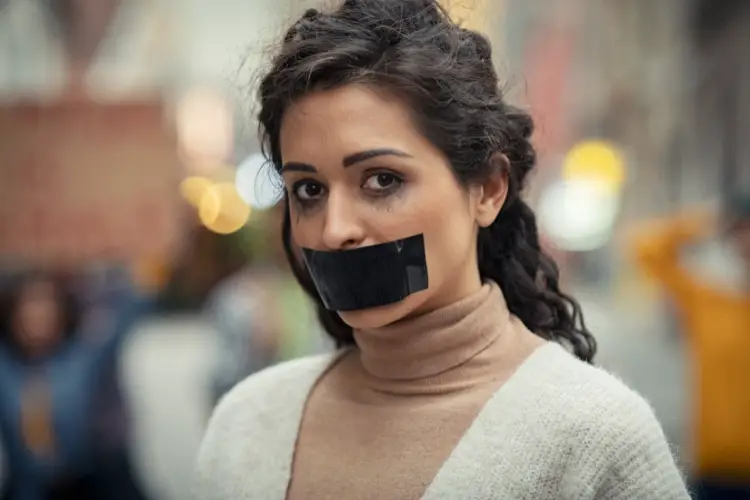Domestic violence is a pervasive societal issue that often conjures images of severe physical abuse, leaving visible scars and bruises. However, the reality is that domestic violence encompasses a wide range of behaviors, many of which are insidious and less overt.
One such behavior that is frequently overlooked or minimized is offensive touching, which can be just as damaging and traumatic as other forms of abuse.
Defining domestic violence and its varied forms
Domestic violence refers to abusive behavior within intimate relationships, including those involving spouses, partners, or family members.
It can take many forms, such as physical, emotional, sexual, financial, or psychological abuse. Often, these different types of abuse occur in tandem, creating a complex and multifaceted pattern of control and intimidation.
The misconception that domestic violence is limited to severe physical abuse
A common misconception is that domestic violence solely involves severe physical violence, such as punching, kicking, or using weapons.
This narrow view fails to recognize the subtler, yet equally harmful, forms of abuse that can occur within intimate relationships. Offensive touching, while sometimes dismissed as insignificant, can be a powerful tool of control and a precursor to more severe violence.

Definition of offensive touching
Offensive touching refers to any unwanted physical contact that is sexual in nature or inflicts injury or humiliation. This can include groping, pinching, grabbing, restraining, or any other form of inappropriate and non-consensual touching. It is important to note that offensive touching does not require visible physical injury to be considered abusive.
Examples of behaviors that constitute offensive touching:
Offensive touching can manifest in various ways within a domestic violence context. Some examples include:
- Unwanted sexual touching or groping
- Forcibly restraining or holding a partner against their will
- Pushing, shoving, or forcefully grabbing a partner
- Intentionally causing physical discomfort or pain through rough handling
- Touching a partner in a demeaning or humiliating manner
Offensive Touching as a Tool of Power and Control
1. How offensive touching is used to intimidate and degrade
Offensive touching is often used as a means of asserting dominance and control over a partner. It can be a way for the abuser to intimidate, degrade, and instill fear in their victim.
The act of violating personal boundaries and consent through unwanted touching reinforces the abuser’s sense of power and authority within the relationship.
2. The link between offensive touching and emotional abuse
Offensive touching is frequently accompanied by emotional abuse, such as verbal insults, threats, and manipulation.
This combination can create an environment of constant fear and uncertainty, where the victim never knows when they might be subjected to unwanted physical contact or emotional torment.

The Dangerous Escalation Potential
How seemingly minor acts of offensive touching can be precursors to more severe violence
While offensive touching may initially seem minor or isolated, it is often a precursor to more severe forms of domestic violence.
Abusers may use offensive touching as a testing ground, gradually escalating their behavior to gauge their partner’s reaction and establish further control. If left unchecked, offensive touching can spiral into physical violence, sexual assault, or other life-threatening situations.
Legal Ramifications of Offensive Touching
1. Criminal charges associated with offensive touching
Offensive touching is recognized as a criminal offense in many jurisdictions. Depending on the specific circumstances and severity of the behavior, individuals can face charges ranging from assault and battery to sexual assault or domestic violence charges. Even in cases where visible injury is not present, offensive touching can still constitute a legal violation.
2. Enhanced penalties in the context of domestic violence
In many states, if offensive touching occurs within the context of an intimate or domestic relationship, the penalties can be enhanced.
This recognition of the heightened vulnerability and power dynamics present in domestic violence situations allows for more severe consequences for offenders.

The Devastating Impact on Victims
1. Fear, anxiety, and trauma as consequences of offensive touching
The impact of offensive touching on victims should not be underestimated. Even seemingly minor incidents can leave victims feeling violated, anxious, and traumatized.
The constant fear of being subjected to unwanted physical contact can take a significant toll on an individual’s mental health and well-being.
2. Damage to self-esteem and long-term psychological effects
Offensive touching can also have long-lasting psychological effects on victims. The violation of personal boundaries and lack of consent can lead to feelings of shame, low self-worth, and a loss of control over one’s own body and autonomy.
These effects can persist long after the abuse has ended, requiring professional support and counseling to overcome.

Seeking Help and Empowerment
1. Emphasizing that victims are not alone and not to blame
It is crucial for victims of offensive touching within domestic violence situations to understand that they are not alone and that the abuse is never their fault.
No one deserves to be subjected to unwanted physical contact or any form of abuse. Breaking the silence and seeking support is an essential step towards healing and empowerment.
2. Resources and support systems available for survivors
There are numerous resources and support systems available for survivors of domestic violence, including hotlines, shelters, counseling services, and legal assistance.
Organizations such as the National Domestic Violence Hotline (1-800-799-SAFE) provide confidential support and guidance to those seeking help.
3. Strategies for prioritizing safety
For individuals currently experiencing offensive touching or other forms of domestic violence, prioritizing personal safety is paramount.
This may involve creating a safety plan, identifying trusted individuals or organizations to reach out to, and exploring options for temporary or permanent separation from the abusive partner.
Conclusion
Offensive touching, while often overlooked or minimized, is a form of domestic violence that can have severe and long-lasting consequences. It is a tool of power and control, used to intimidate, degrade, and establish dominance within intimate relationships. Even seemingly minor incidents of offensive touching can escalate into more severe forms of violence and abuse if left unchecked.
It is essential to recognize the gravity of offensive touching and understand that it is never acceptable or justifiable. Victims should know that they are not alone and that there are resources and support systems available to help them break free from the cycle of abuse.
By raising awareness about the complexities of domestic violence, including offensive touching, we can promote a deeper understanding of this pervasive issue and empower survivors to seek the help and justice they deserve. Remember, no form of abuse is acceptable, and every individual has the right to feel safe, respected, and in control of their own body and autonomy.
FAQs:
FAQ 1: Can something as minor as a slap or a shove be considered domestic violence?
Answer: Yes. Any unwanted physical contact intended to cause harm, intimidation, or control can fall under the category of domestic violence. Offensive touching sends a powerful message of dominance and can have significant emotional and psychological effects on the victim.
FAQ 2: My partner sometimes grabs me or pushes me during arguments but doesn’t leave bruises. Is this still abuse?
Answer: Absolutely. Domestic violence is not solely about leaving physical marks. Offensive touching is often a way to assert power and control, even if it doesn’t cause visible injuries. This behavior is unacceptable and could signify a larger pattern of abuse.
FAQ 3: What’s the difference between offensive touching and assault?
Answer: In many legal systems, offensive touching may be considered a lesser form of assault, typically a misdemeanor. However, when offensive touching occurs within an intimate relationship, it becomes part of domestic violence which often carries more serious legal implications.
FAQ 4: I’m afraid of my partner, but they haven’t actually hit me. Should I still be concerned?
Answer: Yes. Fear in itself is an indicator that something is fundamentally wrong within the relationship. Offensive touching creates an environment of intimidation and anxiety, and it can escalate to more severe violence. Prioritize your safety and seek help from domestic violence resources.
FAQ 5: What should I do if I’m experiencing offensive touching in my relationship?
Answer: Here are vital steps to take:
- Recognize you’re not to blame: The abuser is always responsible for their actions.
- Don’t minimize it: All forms of abuse are serious.
- Prioritize your safety: Create a safety plan, and consider leaving the situation if possible.
- Seek support: Reach out to trusted individuals, domestic violence helplines, or online resources for guidance and support.


